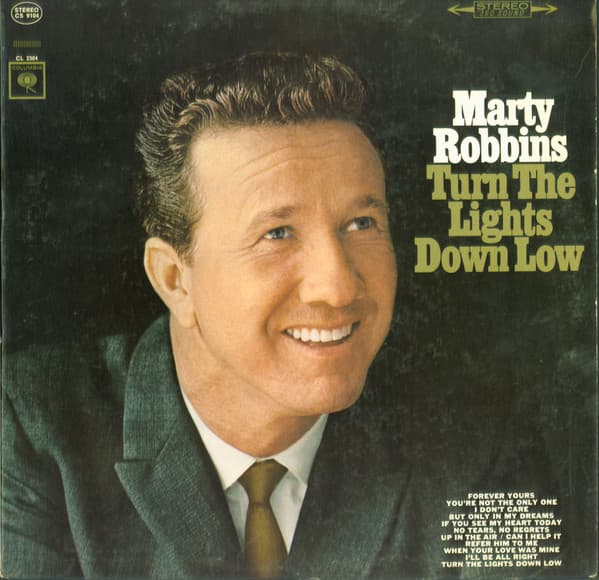
The Quiet Plea for Intimacy: Marty Robbins’ Tender, Yet Underrated Ballad
In the grand, sweeping narrative of Country Music’s golden age, certain voices don’t just sing songs—they cast long shadows of legend. Among the greats, the name Marty Robbins stands for an unparalleled versatility, a master capable of painting cinematic tales of the dusty West with an acoustic guitar (“El Paso“), or stripping away the spectacle to deliver a devastatingly raw ballad of the heart. The 1965 track, “Turn The Lights Down Low,” is a profound, yet often-overlooked entry in the latter category, a song that speaks volumes in its quiet simplicity and tender melody, resonating deeply with the seasoned listener who understands that the greatest romance often happens when the world is muted.
Released on the album, also titled Turn The Lights Down Low, in 1965, the song was a smooth, contemplative pivot away from the dramatic gunfighter sagas for which Robbins was so famous. While the album itself did not make an appearance on the main Billboard Top LPs chart, the single found modest but notable success in the contemporary adult market, a testament to its gentle crossover appeal. Specifically, the track reached an impressive peak of #6 on the Canadian Adult Contemporary (AC) chart, demonstrating that its smooth, heartfelt sentiment found a warm and receptive audience who appreciated music that spoke to the mature side of love. It was a quieter victory for Robbins, one that proved his artistry wasn’t confined to saddles and spurs but could effortlessly capture the hushed atmosphere of a late-night living room.
Written by the talented Joe Babcock, “Turn The Lights Down Low” is an intimate, beautiful story, one less about a grand adventure and more about the delicate vulnerability of a lifelong connection. The song’s meaning is laid bare in its very title, yet the emotional depth goes far beyond mere dimming of a lamp. At its core, it’s a plea for authentic connection and a refuge from the day’s harsh glare.
“Turn the lights down low,
Come and sit beside me, dear,
Lay your weary head upon my shoulder.
Let the shadows hide the silver in your hair,
And help us both forget we’re growing older.”
This is not a song of youthful passion, but of a quiet, enduring love—the kind that survives years, worries, and the relentless march of time. The lyric about letting the shadows hide the “silver in your hair” is a gut-punch of gentle realism. It’s an acknowledgment of age, not with dread, but with a wish to temporarily escape its visible evidence, allowing two souls to reconnect as they were, simply through feeling, not through sight. It’s about being seen, truly seen, not as an aging partner, but as the beloved person whose heart remains unchanged.
In a musical era often characterized by bold arrangements and burgeoning rock and roll energy, this track is a tranquil oasis. Marty Robbins’ delivery, always impeccably controlled, takes on a buttery softness here. His voice is rich, warm, and comforting—the sound of a trustworthy companion. It’s a sonic embrace, a gentle croon that suggests the narrator is less a fiery cowboy and more a devoted husband, grateful for the simple solace of his partner’s company. For listeners who came of age in the 1950s and 60s, a song like this was a soundtrack to the quiet moments after the children were asleep, a subtle confirmation that true romance was about companionship and sanctuary, not just fireworks.
Decades later, “Turn The Lights Down Low” serves as a poignant reminder that some of the greatest songs are the ones that whisper instead of shout. It’s a hymn to longevity, a beautifully woven piece of music that encourages us to stop, take a breath, and appreciate the comfort found in the quiet glow of intimacy, free from the world’s scrutiny and the vanity of youth. It is a song to savor, preferably just as Marty Robbins instructed: with the lights turned down low.